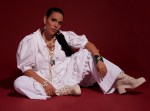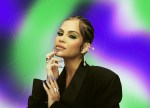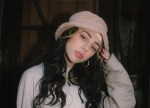Lauren Jauregui is a once-in-a supernova artist. Her name alone invokes the memory of the six years she spent in Fifth Harmony which, in its prime, was considered the world’s biggest girl group. Here, as a Miami-raised Cuban-American teenager, she was catapulted into global fame almost overnight, thrust into the all-too-bright public spotlight with music she didn’t write but performed, and thus garnered a fervent following. Upon Fifth Harmony’s 2018 split, Jauregui’s debut was arguably the most awaited. She had this uncanny ability to touch people through her words and activism, which she shared on her social platforms, connecting to the souls of listeners in an industry that can often feel superficial.
After an era of singles starting with 2018’s critically-acclaimed “Expectations” and leading up to last year’s mid-tempo and intimate “50 Ft.,” Jauregui has finally released her first full body of work, Prelude. The mostly English-sung project has been in the works for the past four years and is Jauregui’s first project released as an independent artist. Earlier this year, she exited Columbia Records and started her own label, Attunement Records, partnering with the distribution company AWAL.
Over its seven tracks, Prelude showcases Jauregui at her best and most expressive—from the delicately powerful romanticism of R&B track “Don’t Want to Say,” to the anthemic self-awareness collaboration with 6lack “On Guard.” The entire EP has Jauregui’s particular brand of soulfulness woven into every note. Prelude is an utmost ode to self: combining both the person Jauregui has become and the deep-set life lessons that have shaped her.
Remezcla talked to Jauregui about her rewarding transition into being an independent artist, her love for string instruments, and how Latinidad subconsciously seeps its way into her work.

When it was announced that you were going independent for this era, I felt so excited for you, like you had finally come home. Going into your first official era, do you feel like the rewards of being an independent artist and having full creative control outweigh having to foot the bill for the cost of the art?
Absolutely, yes. I have no problem investing in myself and in my creative vision. I think that that’s why money exists, to fuel our dreams and to secure our realities. I am lucky to have really great supporters and really amazing partnerships, and will hopefully develop more partnerships in the future with people who help me bring my dreams to fruition.
What stands out to me with Prelude is your writing. You’ve spoken before about writing being your highest tool of expressionism, but this EP seems elevated. What was the process like in writing this album and crafting these very visual stories?

The writing process for these songs specifically took place over 2018 and 2019. 2020 and 2021 were really just spent finalizing everything from all ends, especially the music—the sonics of it and the strings and the trumpet and the background and harmonies. The color and shading of things took place over the later years. These songs have definitely lived with me and grown with me. Lyrical content-wise, I feel like I’ve been this person for a really long time. And when I’m telling a story or writing a poem or writing a song, I really take the concepts seriously. I like to really dive into it and see how am I feeling, how the story is progressing when someone is listening to it, where are they starting, where are they ending, where am I taking them, and what am I trying to convey to them while they’re on that journey. I think each one of these songs really did that.
You’ve mentioned before that this album feels like your clearest expression of self. I can definitely see where your Cuban roots come in with the trumpets in “Scattered” and the Spanish singing in the second verse of “Don’t Want to Say.” How important was it for you to incorporate your Latine heritage into the sonic landscape?
I wouldn’t say that I focused heavily on it, to be honest. I feel like I’m Latina because I’m Latina, not because I’m using trumpets or because I’m speaking Spanish. I feel like Latinidad, at this point especially, in the diaspora that we live in, kind of transcends just a sound. And I feel like I’m definitely influenced majorly by sounds that are traditionally in salsa or reggaeton. Culturally speaking, the Spanish language is very expressive and beautiful and poetic, and I love expressing myself in Spanish, too. I draw from it just naturally, just when it comes out, when I feel like it fits. And a lot of the time, I don’t think about it. It’s not like I’m like, “I want to express my Latina-ness in this song.” I want to use trumpets because I grew up listening to this real brassy salsa music, and I love the way that that shit makes me feel inside. I love what it elicits in me, this soul music. I love jazz chords, and I think salsa has elements of jazz in it. So it’s a whole wide range of influences across these sonic landscapes that I am influenced by listening to music across my American and Cuban background.

“I feel like I’m Latina because I’m Latina, not because I’m using trumpets or because I’m speaking Spanish. I feel like Latinidad, at this point especially, in the diaspora that we live in, kind of transcends just a sound.”
I love the way you phrased that. Like it’s a subconscious expression of self rather than deliberate because it’s so ingrained in you.
Right!
One of my favorite things about this project is your use of string instruments throughout it because strings are my favorite instrument.

Love strings.
You start off “Don’t Want to Say” with this delicate sound, which is a contrast from the deeper, almost ominous vibes on “Intro.” As Prelude is a very personal work, how do you feel like the usage of strings helped to paint the sonic landscape to show your emotional journey?
I feel like strings sing. They have their own tone of voice and they add in little cries or sighs throughout the song. I think that they accentuate feelings really beautifully depending on what you want to use them for. I used them in harmony spaces, and then in fleeting moments. And then I used them as a bed, and then I used them as a lead. They kind of have their own life throughout the songs. I just think they’re romantic as fuck and beautiful—I love adding cinematic elements to my music.

Speaking of cinematic, how did you feel like the incorporation of your Moment House performance into this era, especially before the release of Prelude, heightened the album experience?
I released the performance first because I really wanted people to listen. At least, the people who were waiting—
*raises hand*
EXACTLY! Exactly. The people who really knew what’s up and were waiting for whatever it was that I was doing. I wanted to give them that sneak peek into the world before it all got revealed. And visually, it had to be brought to life. All of the songs had to be brought to life, one way or another, and I think we did a really beautiful job of doing that with Prelude with the live experience. There’s pieces of the live experience already out, the “Colors,” “On Guard ft. 6lack”, and “Scattered” videos, and I’ll be sharing the rest of the videos soon, so y’all can see it and experience it. And those who aren’t fans can also have access to it. And yeah, I’ve just always loved having those cinematic elements in things. I love films and I love TV Shows and I love storytelling in all kinds of ways, and I think that visual storytelling is especially important in this day and age because people’s attention span is so small. When you capture an audience visually, then they’re more inclined to listen.
With releasing a project as identity-focused as Prelude, how are you feeling to have these pieces of yourself out there? And what lessons do you hope that your listeners take from something as self-reflective as this?
I’m just ready for people to have it, ready for people to listen. I’m ready. I hope that people feel seen. I hope that they listen to it and they’re like, “Damn, I feel like this sometimes too, fuck.” And then when they do feel that, they can put it on and feel better and less alone.
Listen to Prelude below.




